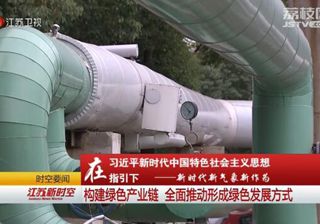East China’s Jiangsu province has promoted its 263 Action Plan to phase out obsolete production capacity and focus on industrial recycling in a bid to build a green industrial chain system.
The Baizhang Thermal Station of Changzhou High-tech Zone has shut down its four coal-fired units which used to provide thermal power for dozens of enterprises in the zone by consuming 45000 tons of coal.
Instead of simply turn them off, Changzhou High-tech Zone sorted out the demand for thermal energy by all the enterprises in the park and installed a thermal power transmission pipeline between the State Grid power plant and the enterprises so that the excess thermal energy of the power plant is supplied to the firms. In the meantime, the thermal station has shifted towards the operation of energy management and services.
By complying with the 263 Action Plan, Changzhou High-tech Zone has shut down 240 coal-powered generating units and 40 small chemical plants while setting aside 7.3 billion yuan for the launch of 30 energy-saving and emission reduction projects to ensure that the sewage pipes and treatment facilities in the zone will cover the entire zone.
The “263” Action Plan is a key initiative to fight against environmental pollution, which includes subthemes like coal consumption reduction, the reduction of backward production capacity, hazardous waste governance and VOC governance.
Last year, the new and hi-tech zone had 11 more days that were rated good air quality while the PM2 concentration decline 7.6% year on year.
In the meantime, Jiangsu has focused its attention on the reform of industrial recycling of various kinds that constitute more than half of the economic momentum. Three state-level low-carbon industrial parks have been piloted to build a green low-carbon public service platform.
By 2020, recycling transformation will have been done with the industrial parks at the provincial level and all the chemical industry parks across the province. In 2017, Jiangsu completed the task assigned by the central government ahead of schedule to eliminate backward production capacity.
In 2017, the coal consumption of enterprises above the designated size in the province was reduced by 6.05 million tons over the same period of the previous year with 3347 VOC treatment projects completed and 22 enterprises ranked among the national green factories. The added value, investment and energy consumption of high energy-consuming industries showed slower growth or negative growth to achieve a win-win situation in economic growth and energy saving.
Jiangsu is now poised to further promote the "263" Action Plan in 2018 while maintaining steady economic growth so as to further resolve its excess capacity, eliminate backward production capacity, take green production as an important part of industrial upgrading and promote further implementation of energy conservation and emission reduction projects in order to make room for the increase of effective supply.
(Source:Jiangsu International Channel)






